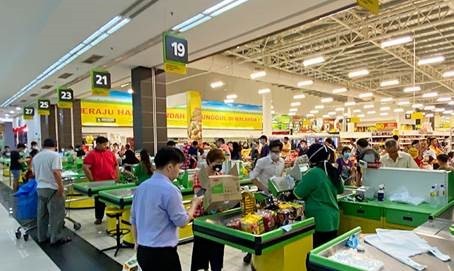
PETALING JAYA: The Malaysian economy appears on track to avoid a technical recession this year, according to economists.
However, they also warn that certain “troubling signs” must be acknowledged and addressed to ensure that the economy stays on the right track.
Many have expressed fears that with a global recession looming, Malaysia could follow suit this year.
At the World Economic Forum in Davos early in the year, two-thirds of economists polled said a global recession was likely in 2023.
The signs are already there. For instance, recent forecasts have largely pointed to a recession in the US as soon as the second half of this year.
Across the Atlantic, recently revised data shows that the Eurozone saw a 0.1% gross domestic product (GDP) contraction in each of the last two quarters.
A contraction in the GDP over two consecutive quarters constitutes a technical recession.
But back in Malaysia, economists are not as pessimistic. For instance, Universiti Malaya professor of economics Rajah Rasiah told FMT Business that with exports to the US having largely been decoupled from its market since 2010, external shocks are not expected to have a huge impact on the Malaysian economy.
“Nevertheless, Malaysia has to strengthen the domestic production of essential goods, especially food, which has faced a chronic trade imbalance over the period from 1989 till 2022,” he said.
Malaysia University of Science and Technology academic Geoffrey Williams said that while Malaysia is expected to steer clear of a technical recession, a broader definition of a recession would serve as a better indicator to assess the state of the country’s economy.
This is because Malaysia’s GDP is being “artificially held up by higher government spending due to the delayed 2023 budget, and higher inventory activity due to trade flows”.
Malaysia’s latest industrial production index (IPI) and manufacturing sales value (MSV) data signalled certain weaknesses in the economy, Williams told FMT Business.
Data from the statistics department shows that the country’s IPI dropped 10.8% month-on-month (m-o-m) and 3.3% year-on-year (y-o-y) in April while MSV fell 7.2% m-o-m and 2% y-o-y.
“Now it is becoming evident at the sector indicator level that there is a general contraction in production, manufacturing sales and also retail sales,” Williams said.
“This is consistent with the experience regionally and globally with (the) Euroland in technical recession too.”
China under-performing
The slump in Europe and the US is expected to hit Malaysia’s exports hard, particularly the electrical and electronics sector.
“A contraction in the US and EU markets will gradually reduce demand for electronics, especially semiconductors and solar panels, as the US’s China containment policy means Malaysian exports to China have long fallen,” Rasiah said.
He said transnational corporations in Malaysia exporting to the US would continue to show a contraction consequently, which may explain why the country’s trade surplus has been falling over the past three months.
At the same time, the disappointing impact of China’s reopening has also hurt Malaysia’s export performance.
“For instance, China’s PPI (producer price index) is in deflation and its reopening has not had the positive effect expected,” Williams said.
“Hence, the inventory build-up in March has not been sold off, so production in April was pulled back. We expect this to continue all year.”
Amidst the ongoing geopolitical and economic tension, Tholos Foundation analyst Philip Thompson advised Malaysia to maintain its neutrality and make the best out of the situation.
“The part of this expected recession, which is different from past recessions, is the geopolitical factor. There’s the Ukraine-Russia war which has destabilised European economies that depended on Russian energy, there’s the American decoupling from China for competitive reasons, and also stricter environmental rules from Europe,” Thompson said.
“Malaysia would best position itself by staying out of these power struggles. By staying open and avoiding protectionist policies the market, rather than policymakers, can make these complex decisions.
“For instance, Malaysia can be a home to firms leaving China that still want to serve the American market, it can also attract high-end manufacturing for assemblers based in China serving China’s consumers.”
Source: https://www.freemalaysiatoday.com/category/highlight/2023/07/12/recession-unlikely-despite-red-flags-say-economists/

